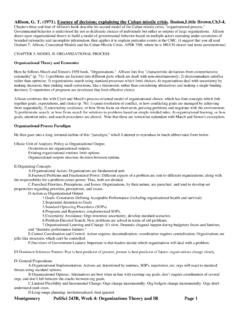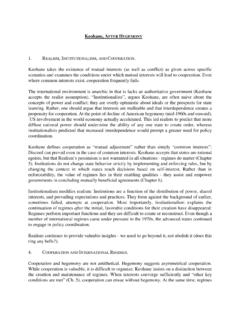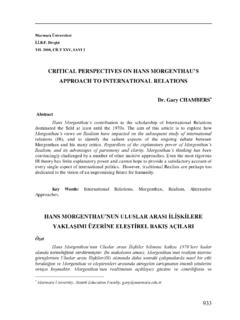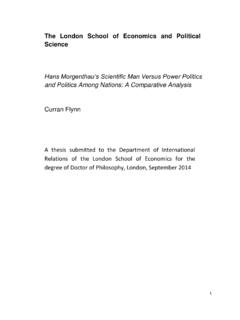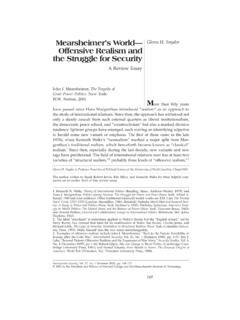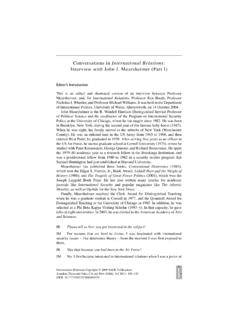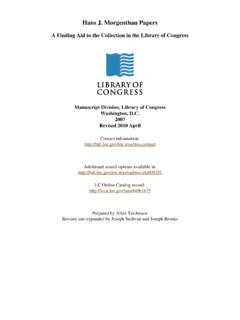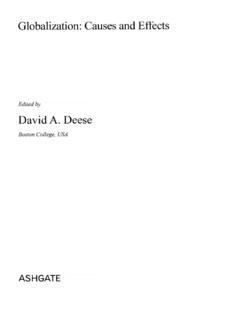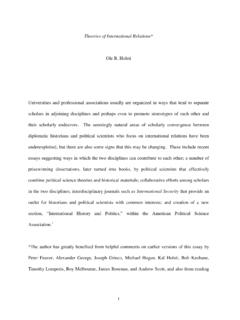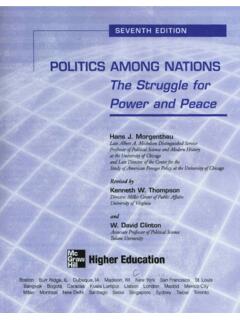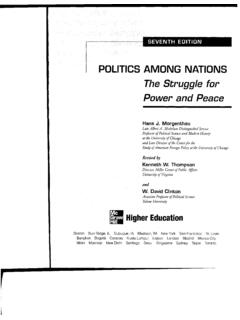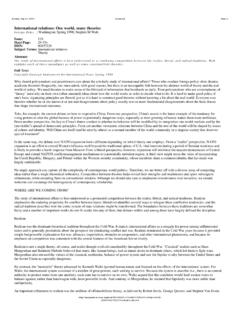Transcription of Chapter 1 ‘A Realist Theory of International Politics ...
1 David Siddhartha PatelAutumn 1999 Hans J. Morgenthau, Revised by Kenneth W. Thompson. Politics among nations (1948, revised 6th ed. 1985), chap 1 A Realist Theory of International Politics Quick summary: political realism = nations are conceived as political entities pursuing their respective interests defined interms of divides the history of modern political thought into two distinct schools, realism and other (presumably idealism ), that differ fundamentally in their conceptions of the nature of man, society, and other school assumes the essential goodness and infinite malleability of human nature. It sees education (increasedknowledge and understanding) as the path to social order and argues the world is a result of forces inherent in human nature (and hence fundamentally unchangeable).
2 One mustwork with these forces, not against them. The world is inherently comprised of opposing interests and defined by the conflictsamong them. As opposed to the alternative school, it looks to historical precedents rather than abstract principles to understandpolitics. It is called realism because it is concerned with human nature as it actually is (versus what it could/should be) andhistorical processes as they actually take Principles of Political Realism1. Politics , like society in general, is governed by objective laws that have their roots in human nature. These objectivelaws allow us to differentiate truth from opinion the difference between objective and rational truth (supported byevidence and reason) and subjective judgement. We must also approach political reality with a rational outline/map inorder to understand chosen Interests are defined in terms of power.
3 We assume that statesmen think and act in terms of interest defined as power.(p. 5) Politics is an autonomous sphere apart from economics, ethics, religion, culture, etc. This guards against two popularfallacies: the concern with motives and concern with ideological preferences. Motives alone can not predict either behavioror outcomes/success and are difficult to clearly identify. The intellect, will, and action of statesmen are more importantthan motives. Political realism is not indifferent to political ideals and moral principles but it distinguishes between thedesirable and the possible. The rational elements are necessary to make reality intelligible for Interest defined as power is a universally valid objective category (but the meaning can change).
4 The idea of interestis unaffected by time and place. This provides a link through history from Thucydides to Salisbury to Washington toWeber, etc. The kind of interest determining political action in a particular period of history, however, depends upon thepolitical and cultural context. Goals/objectives can vary. This also applies to power. Content and use of power determinedby political and cultural context. Power may comprise anything that establishes and maintains the control of man overman. (p. 11) The contemporary character of International relations can change. While the Realist indeed believes thatinterest is the perennial standard by which political action must be judged and directed, the contemporary connectionbetween interest and the nation state is a product of history, and is therefore bound to disappear in the course of history.
5 (p. 12) Different units (larger or smaller) are possible but such transformation can only be achieved through themanipulation of the constant forces that have shaped the Universal moral principles must be filtered through concrete circumstances of time and place. The state has no rightto allow moral principles to impinge on successful political action (because of primacy of national survival). There can beno political morality without prudence. Prudence, the weighing of the consequences of alternative political actions, is thesupreme virtue in Moral aspirations of a particular nation do not equal the moral laws that govern the universe. Truth and idolatry aredistinguished just as truth and opinion were earlier. We must be able to judge action/interests from same standards:interests defined in terms of The difference between political realism and other schools is real and profound.
6 The political Realist subordinatesstandards of thought appropriate to other spheres (economic, legal, moral etc) to those of Politics . Defending the autonomyof the political sphere does not, however, disregard the existence and importance of these other modes of thought. Itmerely implies that each should be assigned its proper sphere and function. Must differentiate political realism with legalistic-moralistic approaches to International Politics .

